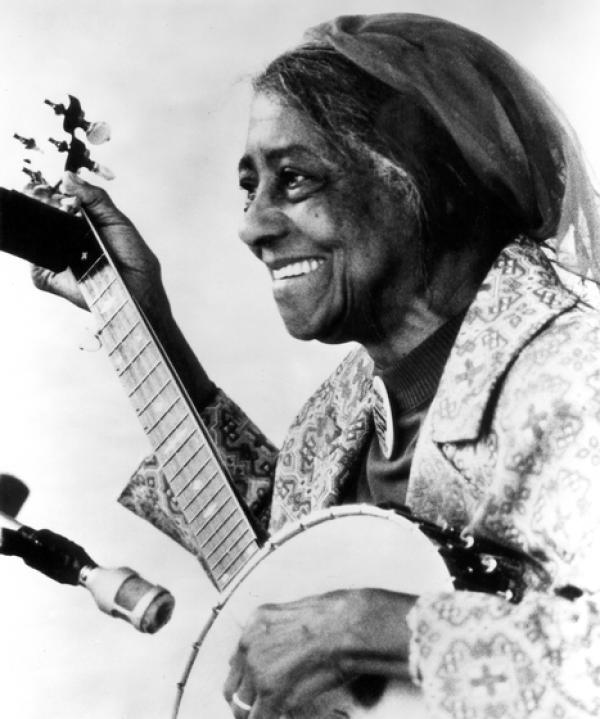Elizabeth Cotten

Photo courtesy of the Ralph Rinzler Folklife Archives & Collections
Bio
Elizabeth "Libba" Cotten was born in January 1892 near Chapel Hill, North Carolina. As a child, she liked to play with her brother's banjo, and pick out tunes on the instrument "upside down." Like her brother, she was left-handed, and it was more comfortable to hold the banjo upside down so she could play it with her left hand.
When she was nine years old, Cotten was forced to leave school and work as a domestic in the homes of white people. At age 12, she had a live-in job in Chapel Hill, earning a dollar a month that her mother saved to buy her first guitar, a Stella. Cotten taught herself to play, first laying the instrument flat on her lap and picking one string at a time. Later, she began to master complete chords, picking the guitar upside down, in a manner similar to the way she had tried to play the banjo.
By the age of 14, Cotten was able to perform a relatively large repertoire of rags and dance tunes, some of her own composition, all decorated with her distinctive lyrical musicality. She often stayed up into the night playing her guitar and didn't cease until her mother woke up and scolded her to go to bed.
In her teens, she experienced a religious conversion and the deacons of her new church encouraged her to stop playing "worldly" music because that was "for the devil." At first, it was difficult for her to "put down her instrument," but her commitment to the church was tenacious, and gradually she honored their request and stopped playing the guitar for almost 50 years.
Cotten recalled that getting married to her husband, Frank Cotten, helped her stop playing because she was busy being a new wife, keeping house, and becoming a mother. To supplement her husband's income without going out to work, Cotten took in washing and ironing. All of these things kept her busy and eventually she forgot about the guitar.
In 1943, Cotten moved to Washington, DC, to be near her grown daughter when her baby was born and to help care for her family. She did day work (cleaning) and sold dolls in Lansburgh's department store during the holiday rush. One of her customers, Mrs. Ruth Crawford Seeger, was so taken with the gentle way Cotten interacted with the Seeger children in the store that she offered to hire her. After the holidays, Cotten left the store and began working for the Seeger family. The Seeger home contained several instruments, and it was there that Cotten resumed playing the guitar. She used to sit in the dining room and play. One day the Seegers heard her playing and asked her to teach them how to play that song she had been playing. It was called "Freight Train," a "make-up" song she wrote for a family gathering when she was only 12 years old.
"We used to go over to the railroad track and play," she said. "We'd take straight pins, lay them on the railroad track and make little alphabets out of them. We'd know just about the time when the train was either coming or going, and the train would run over the pins and mash them together, stick them right together, and we'd have a little box of alphabets of pins.... After that, me and my brother, we'd have to cut wood. We would each have a song, he had his and I had mine. We used to sing about trains. That was the beginning of me writing 'Freight Train,' right about then. That was a long time ago...."
Cotten credited the Seegers for helping her to rediscover playing and singing. The Seegers are a family of musicologists, composers, collectors, and performers. Initially under their sponsorship, Cotten began performing in concerts and festivals nationwide, and made several recordings prior to her death in 1987.

